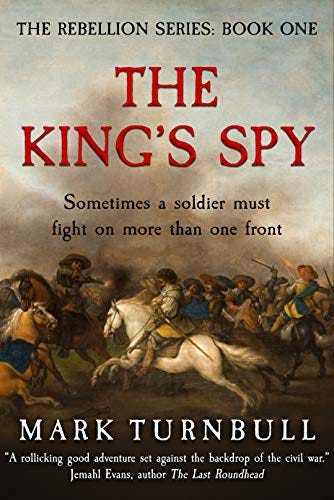Spy Games in the English Civil War
Book Review: ‘The King’s Spy’ (2021), by Mark Turnbull
Mark Turnbull’s novella begins at the Battle of Naseby in June 1645, where we meet our protagonist, a Royalist captain named Maxwell Walker whose wife has been killed by enemy soldiers seeking loot, and tracks the three months after this crushing Parliamentary victory, when the outcome of the First English Civil War was in the wind. This focus on the individual amid the events around him allows for a narrative that brilliantly blends together the real timeline of events with the kind of granular personal detail that fiction allows, giving a vivid portrayal of the texture and rhythm of life in seventeenth-century England, from the language to weekly wages to the nature and speed of communications.
Turnbull gives a gnarly depiction of the scene at Naseby, the “smoke of battle that turned every man to a mere grey shadow”, and the brutality inflicted and absorbed. At one point Walker cuts down a Parliamentary soldier with his sword, “only for it to become stuck somewhere within the man’s ribcage”. With the Royalists defeated at arms, the task then is to avoid compounding this loss by allowing the enemy to lay hands on the ciphers that will let them read the letters captured from King Charles I’s baggage train. Such a thing would be of a “propaganda value … worth the equivalent of an entire army”, as the King’ advisers lament.
The spy-war aspect of the English Civil Wars, as with the intelligence dimension in much history, is too often left out of the story. Here, the espionage contest of the English Civil Wars is restored, with all the timeless elements that the second-oldest profession entails—the murk about who is doing what for whom, the deception operations (which sometimes, as in this case, succeed only too well), the fluidity of ultimate allegiances—plus the peculiarities of practicing that profession in the specific setting of the Wars of the Three Kingdoms.
There are no hand-holding exposition-dumps to provide the background of the Civil Wars, only such information as occurs, so to say, “naturally”, as the story moves along, but this does not detract from this being a fast-paced book that is enjoyable to any reader; it merely makes it doubly so, if one has an interest in the period and events. A particularly enjoyable example is a vignette of the Naseby after-action meeting between Prince Rupert, the King’s nephew and the Royalist Commander-in-Chief, and Lord Digby, the King’s dismal Secretary of State.
Turnbull does not go into the origins of the Civil Wars, yet he clearly is not of the Marxist school that back-projects their ideologised vision of the world to cast the 1640s upheaval as an expression of proletariat rage against ruling class exploiters. He excellently shows the way the divisions cut across every social, professional, and economic cleavage in the country, and to the extent there was a geographic pattern to the Civil Wars, it was the Parliamentarians (holding London and the Home Counties), not the Royalists (with their heartlands in northern England and Wales, where they rode to gather support after Naseby), that had the loyalty of the “privileged”.
Relatedly, while giving full scope to the muddled and very human motives that moved people to fight—and to change sides (sometimes more than once)—in the language the two sides use towards each other throughout The King’s Spy, there is a recognition that religion was, if not completely determinative, then the key variable in where people landed once the country was divided by the sword. The Parliamentarians are Puritans, regarding their enemies as “popish” malignants and when areas fall under Puritan rule the statues and stained glass of the churches are swept away in ferocious bouts of iconoclasm, leading to one of the most dramatic set-pieces of the book. The Royalists, by contrast, regard their enemies as “rebels”—the term is a constant, as it was in reality—fired by zeal for an innovative creed that is alien to Protestantism.
Today is the 373rd anniversary of the King’s “execution”, an event—like the Civil Wars as a whole—that is too little remembered at a popular level in Britain. Good fiction can be helpful in reviving interest in forgotten periods. The King’s Spy is an excellent addition to such a project for the Civil Wars, and more than enough encouragement to get hold of the next instalment in Turnbull’s series.


